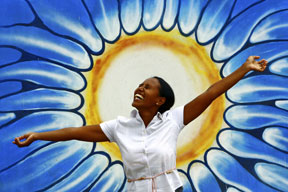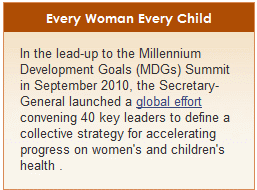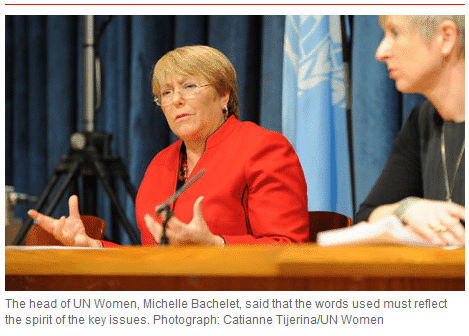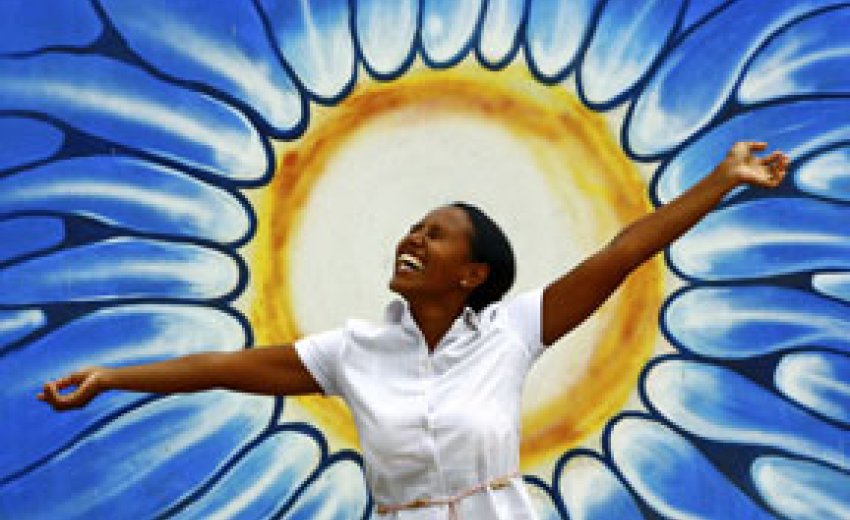Member states of the United Nations will gather in New York for the next two weeks to discuss the elimination of violence against women and girls.
 March 4, 2013: According to UN Women, nearly 7 in 10 women across the world will experience some kind of violence in their lifetimes.
March 4, 2013: According to UN Women, nearly 7 in 10 women across the world will experience some kind of violence in their lifetimes.
“During the past decades, we have made progress in the articulation of international norms and standards, and in national laws and policies,” said Michelle Bachelet, UN Women Executive Director, in a speech in front of the General Assembly today. “But violence against women and girls remains widespread, and impunity is still the norm rather than the exception. Now we must take on the challenge of implementation and accountability.”
The topic of violence against women and girls is one of the most important issues of global development. It affects almost every other aspect of social progress, from indigenous peoples rights to education rights to labor rights to voting rights.
In New York City, this week and next, the United Nations' annual Commission on the Status of Women (CSW) will hold meetings, discussions, debate and make decisions on how to deal with this sweeping and all-encompassing issue. The 57th annual CSW is notable because it's the largest ever international gathering to address the problem.
The RIGHTS blog will be reporting updates and stories from CSW throughout the next two weeks, but before that, here's a basic primer on what to expect and why this year's CSW is worth watching.
A little background
 |
Since the UN Women agency was established in 2010, CSW has had a much more stable working mandate, and a specified group to oversee and provide support, as well as include civil partners via a number of side events, panels and workshops hosted by UN agencies, NGOs and member states themselves. (We'll be reporting from these programs as well.)
During the actual events at the General Assembly, member states, working groups and individuals can address the gathering, but there are also sub-meetings run by previously agreed-on agendas, resolutions and elected leaders.
All of these meetings then come together at the end of the two weeks to consense on what a resolution on ending violence against women and girls will say.
Issues that still need some work
One of the major things to consider (among many, many others) is the fact there exist a handful of international declarations and legally binding treaties specifically regarding violence against women, and they are generally comprehensive. The problem is that many of the signatories are states that operate business as usual and allow violence against women and girls to continue unabated.
In 1999, then-Secretary General Kofi Annan said violence against women is "…perhaps the most shameful human rights violation. And it is perhaps the most pervasive. It knows no boundaries of geography, culture or wealth. As long as it continues, we cannot claim to be making real progress towards equality, development, and peace.” Nothing has really changed since then.
By allowing these nations to continue with impunity is a disgrace, and it's the job of CSW to come up with a system that shames member states into holding up their agreements on this issue.
Interesting things to keep an eye on in 2013 (in our opinion)
Palestine. In its first CSW as a recognized state in the United Nations, Palestine will hold a seat at the first of many "High Level Round Tables" on the theme of violence against women and girls. This is particularly interesting, as the situation with Israel has only intensified since 2011, when violence against women in Occupied Palestine was the subject of a CSW55 resolution, calling on Israel to adhere to the Universal Declaration of Human Rights. We're waiting to see what happens when Palestine enters the room as an equal with Israel this year.
Egypt. Tahrir Square is the site of some of the worst and most often recurring forms of violence against women, and arguably the most visible, as the world continues to keep tabs on that country's fledgling revolution. On Thursday, President Morsi announced that he had met with a women's NGO regarding a bill addressing violence against women (including harsher penalties for perpetrators), and that a delegation from his government would attend CSW in New York this year.
USA. The US has also announced participation in CSW, but their distinct bossiness and leadership is nonexistent in this area (unlike other parts of the UN), especially after the Violence Against Women Act came up against such controversy in Congress earlier this year. Expect to see the US delegation called out for hypocrisy by most, if not all, other participating member states.
Here's an infographic about global trends of violence against women.
And here's a video by the UN about CSW this year.
Follow updates on Twitter with the hashtag #CSW57.
----------------------------------
Related Article:
Michelle Bachelet ready to tone down language on UN women proposals
UN Women head prepared to compromise on wording of Commission on the Status of Women gender violence document to gain agreement of conservative members

Tuesday 5 March 2013: The head of UN Women, Michelle Bachelet, has indicated she would be prepared to compromise on the language used in the Commission on the Status of Women (CSW) outcome document, as long as the words used "reflected the spirit" of the key issues and did not undermine past agreements.
Speaking on the opening day of the CSW in New York, Bachelet said that although the phrasing of the text was important, what was needed was the will and action to eliminate violence against women and girls.
She acknowledged that the issues of sexual and reproductive rights and health were of major importance in ending violence and in poverty alleviation and development, but remained sticking points for some conservative member states of the UN.
"In any area of the UN we … have to agree on certain language that can represent the same spirit, but that can be accepted by everyone," Bachelet said. But she insisted that there must be "no setback on the hard won gains for women and girls", and agreements made at previous conferences, in Cairo and Beijing, must be upheld. "Any language that can reflect the spirit and doesn't set [us] back is welcome. Language is important but not enough. You can have the best language document but what we need is action. We don't need another document to put on the shelf; we need commitments."
Bachelet's comments will dismay some women's rights activists who insist that sexual and reproductive rights and health feature explicitly the CSW final agreement.
But Bachelet knows how difficult it is to negotiate on such a divisive issue. To the anger of activists last year, the term "reproductive rights" was removed from the outcome document of the Rio+20 conference and replaced with "reproductive health" to appease conservative governments and the Vatican, which has a seat on the UN as a non-member permanent observer.
In an interview with the Guardian before the CSW, which runs until March 15, Bachelet said culture, tradition and religion should not be allowed to get in the way of action to tackle violence.
On Monday, she re-emphasised the importance of implementing any final agreements that are made in New York in the coming days, adding that it was important to have buy-in from all member states.
A CSW side event a few hours later on the impact and future of UN resolution 1325 (pdf), highlighted the need for words to be converted into action. Resolution 1325, which was agreed in 2000, acknowledged the particular impact war had on women and the pivotal role they needed to play in conflict resolution and peace building.
However, critics have said that the resolution has failed to penetrate beyond surface level. A report published by the UN in 2010 found that in the past 25 years, only one in 40 signatories to peace treaties have been women.
Urmas Paet, minister of foreign affairs in Estonia, said the resolution had been too much about procedures and not enough about implementation. "Women must be included in mediation, but we still don't see them among the peace negotiators, due to tradition, culture, religion and [lack of] education. Peace doesn't have a women's touch but it needs one," he said. "We need to replace the idea of women as victims, [with] women as actors. Violence against women should become women against violence."
Bineta Diop, founder and president of Femmes Africa Solidarité, agreed. "Even though we have women negotiators, they are not invited to the table. We need to see how 1325 is implemented to help get to that level." She said peace will not be durable if half the population is left out. "That's why it's important to have women that are taking care of society and know how to make sure rehabilitation is done because they have borne the brunt."
Anne Marie Goetz, chief adviser on peace and security at UN Women, said more funds should be channelled to support local women's groups.
